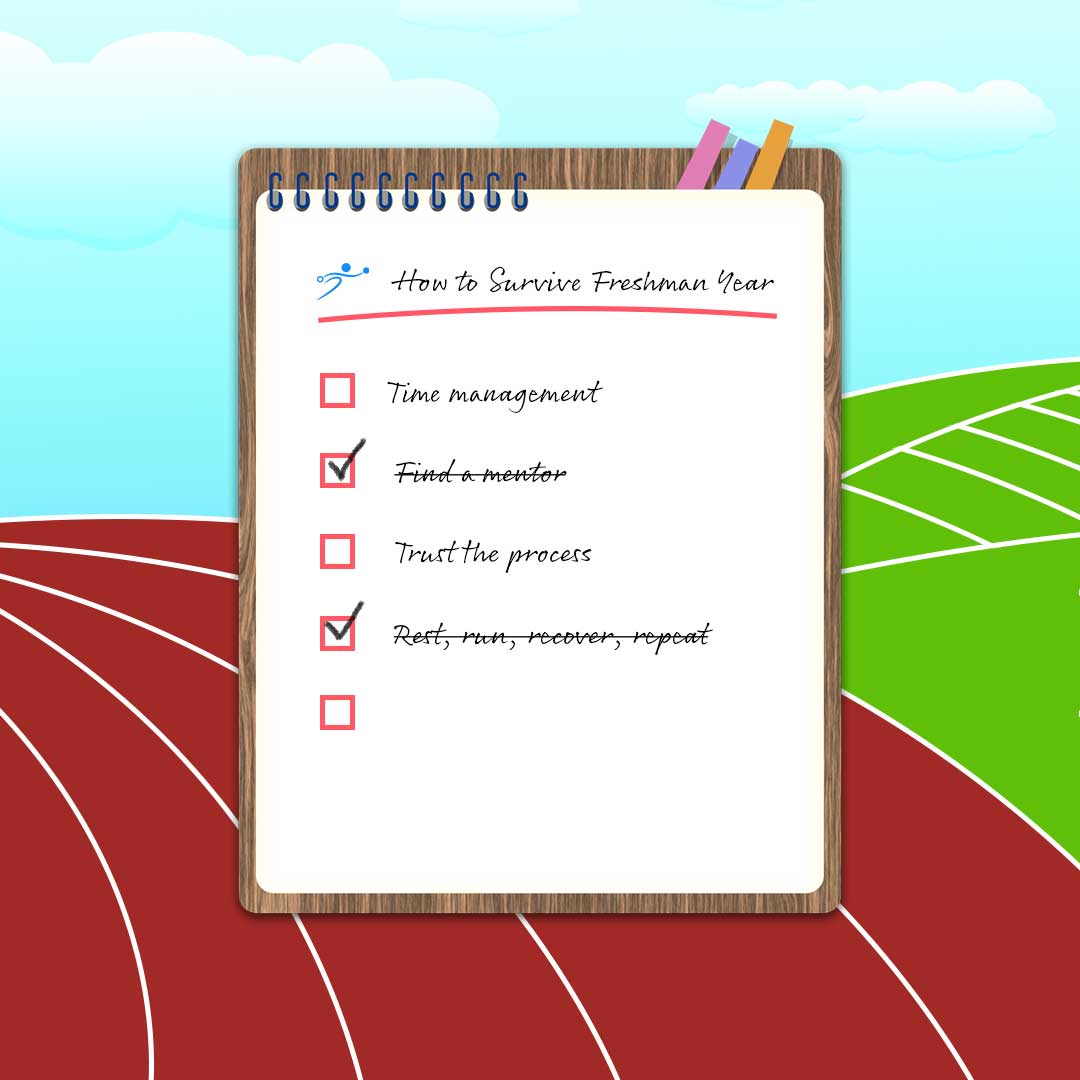College Track & Field Survival Guide: Freshman Edition
Picture this… It’s the summer before your freshman year of college and you're wondering about all the dos and don'ts, the tips and tricks you should know beforehand; as you're a few short months away from starting your collegiate athletics career.
New and exciting things means PREPARATION! To calm your nerves, we’ve compiled a College Freshman Track & Field Survival Guide to set you in the right direction! Including advice from past and present collegiate athletes from our team at Streamline Athletes!

Take a breath – don't do too much at a time
Easier said than done, BUT it is really important to take time for yourself, especially as a collegiate athlete with an extremely busy schedule. Even if it’s a ten minute walk, having space between your academics, sports and social life will greatly impact your mood and energy.
Trust the process
You may have certain expectations of your college/university, the academics, social life, training, coaches, teammates; however, all good things take time. It’s important to trust the process of the four or five short years you have as a student athlete – try new things and meet new people. There may be moments where you doubt your choices and decisions, yet being adaptable is a great strength and will strengthen you as an individual and as an athlete.
When deciding where to go for university/college it is important to choose a school where you would feel like you would have balance both academically, athletically and socially! So if at any moment in time you are struggling athletically, you have a positive academic experience to fall back on and vice versa. In my own time at university I was injured for over two years - so while I couldn't run, I had the ability to really enjoy what I was learning and make new friends.
- Katherine Lucas, Brand Marketing Specialist at Streamline Athletes, UBC Track Athlete and 2022 NAIA 100m Brozne Medalist.
Rest, Run, Recover, Repeat!
You only get one body! Do not feel guilty for taking the time to rest your body and your mind, in fact choosing to rest and recover will make you a stronger athlete! Make the conscious decision every day to do what is best for your body and always be in constant communication with your coaching staff. Each college/university is different, however it’s a good idea to check out all the training and rehabilitation resources available to you. Rest and recovery will set you up for the long run!
“Don't worry too much about performance in your first year. Instead, focus on staying healthy and learning. The transition to a new program can be difficult. It will be easiest to adjust if you're healthy and enjoying yourself!”
- Aaron Ahl, Athlete Recruiter at Streamline Athletes, and Simon Fraser University Track Athlete.
Don't be afraid to take rest days and listen to your body. Only you know how you are truly feeling and your coach should always want what is best for you. If you are getting sick, feeling an injury coming on, or mentally need a break - make it happen. A day or two off is a lot better than a few weeks of forced recovery because you overdid it.
- Devan Wiebe, Client Success Coordinator at Streamline Athletes, and NAIA 800m Champion.
Set up academic and athletic goals
You’ve probably heard of this one A LOT, but setting up academic and athletic goals can be a useful tool to help you outline your goals.
It is as easy as opening a new notes page on your iPhone and writing a few key goals for the track and field season and/or for your school semester. Think of what you would like to succeed in and then HOW you are going to accomplish it all. Just like New Year resolutions, it is easy to write them down and forget about them in a few days. But remember that you only have four/five years as a collegiate athlete, so taking advantage of your opportunities and capabilities will benefit you in the long run!
Even for the most studious, the academic transition into college course load can be a big change. I was warned to expect my academic average to drop 10-15% in my first year, and that warning saved me. Obviously work hard and seek support in your classes, but the knowledge that it was OK for my grades to not be as high as they had been in high school really helped me have a more balanced first year experience.
- Devan Wiebe, Client Success Coordinator at Streamline Athletes, and NAIA 800m Champion.
Good communication
With your professors, coaches, and teammates…
Need to get an extension on an assignment or take an exam at a later date because it collides with a track meet? No problem, as long as you COMMUNICATE and give ADVANCE NOTICE far ahead of time. For the most part, professors are understanding of collegiate athletes and their busy schedules and they will cooperate with you as long as you are responsible with your schedule and plan ahead.
When it comes to coaches, communicate with them and let them know what your goals are — they are here to support you, not only as an athlete but as a student and an individual. Be honest with them if you are having any family issues, injuries, exams or are stressed out. Taking time off is not a bad thing and skipping a few practices isn't the end of the world, your mental and physical health matter!
Figure out the best way to communicate with your coach early on. Coaches are busy people, and knowing how they like to set goals, make training plans, and chat with athletes is key to forming a strong relationship. If your coach holds office hours make the effort to drop by and talk about training and the upcoming season. When a coach knows you better and sees your commitment beyond just practice, it can go a long way in shaping your role on the team.
- Devan Wiebe, Client Success Coordinator at Streamline Athletes, and NAIA 800m Champion.
Time management
Plan, plan, plan
During your freshman year, you are adjusting and adapting to a completely new environment, and with that comes new routines. Planning from morning to night can give you ease of mind to do the things you need to do and not feel stressed about not having enough time. Your busy days will get easier and easier as long as you plan them out! Create a google calendar with different color codes for your school schedule, athletics, social life, etc, this way you will have a visual map and can set reminders and notifications for yourself.
Be your biggest cheerleader
As a collegiate track and field athlete, you are bound to have so much support around you through your coaches and teammates. But it is important to know that comparison is toxic and that everyone has different strengths and weaknesses. Knowing yourself and what you are capable of is all you should focus on. Focus your energy on bettering yourself as a person, student and athlete and you will fly high.
Find a mentor
Whether it’s a teammate, a coach, or another athlete, looking up to someone as a collegiate athlete will help you reach new heights. They can help support you and your goals; whether it's just talking with them, cross-training together or learning how they navigated their time through school . Surrounding yourself with like minded people that uplift you and inspire you is a great way to develop not only as an athlete, but as an individual.
Really make an effort to get to know your teammates - and not just your immediate training/event group! You are going to be with these people for years, and getting to know your entire team will make your experience so much more rewarding!
- Devan Wiebe, Client Success Coordinator at Streamline Athletes, and NAIA 800m Champion.
Need more advice?
Feel free to reach out to us on any of our social media channels
Instagram Facebook Twitter
Processing your application
There was an error sending the email, please try again

